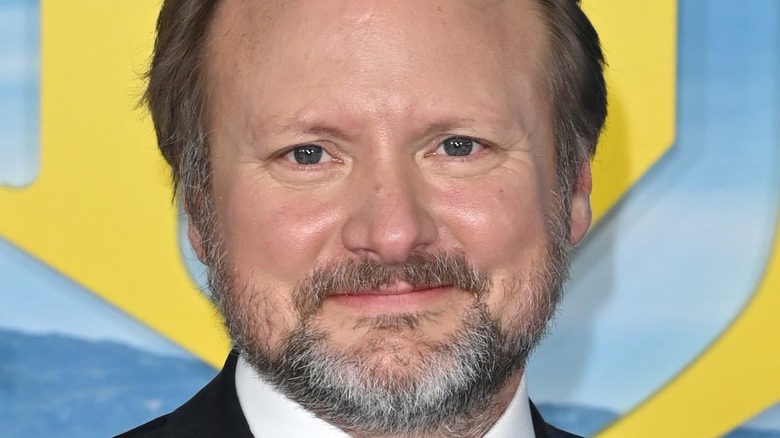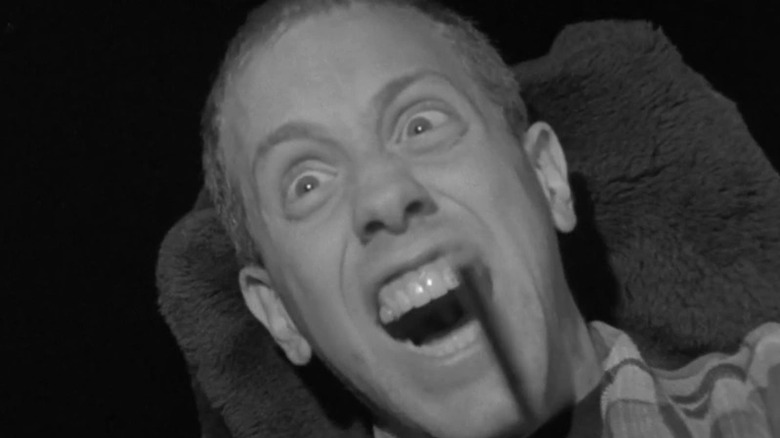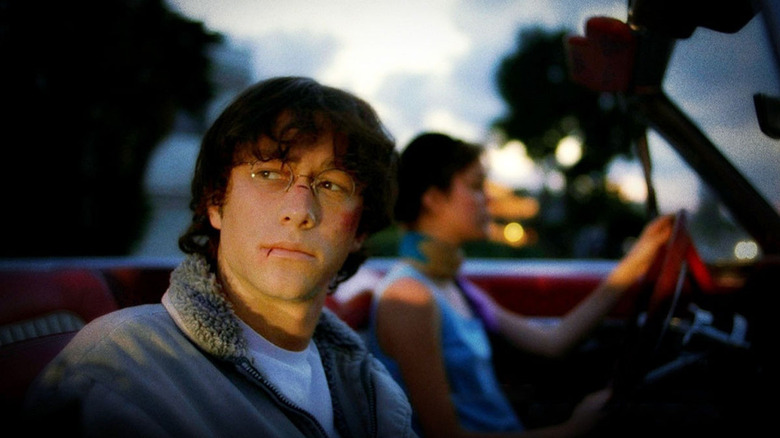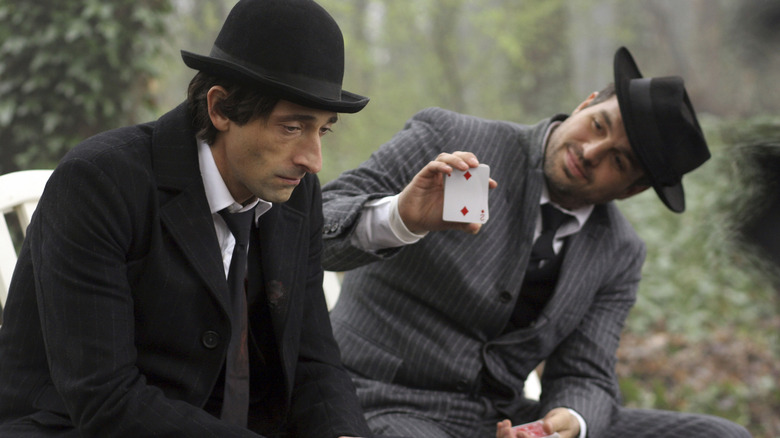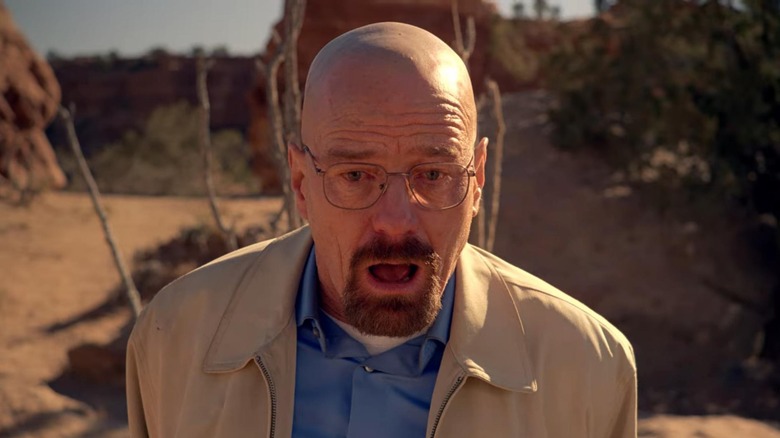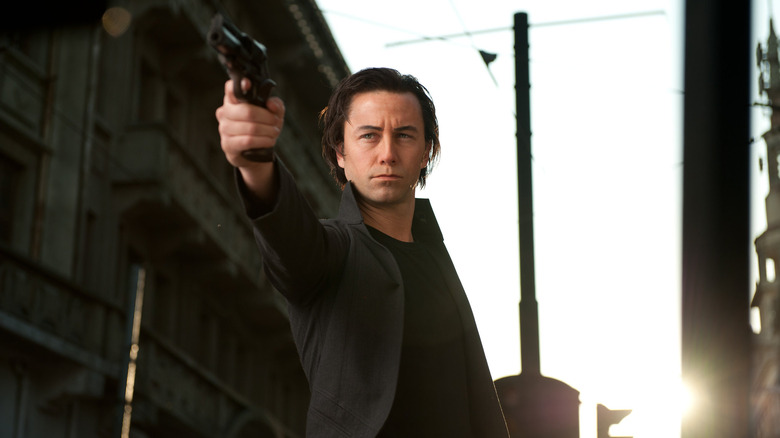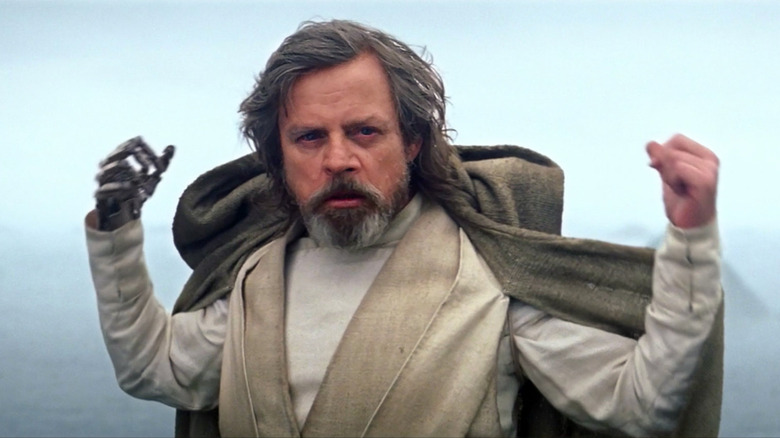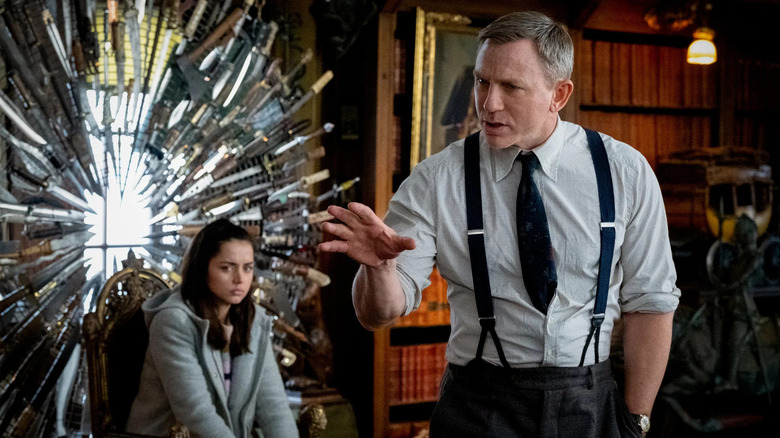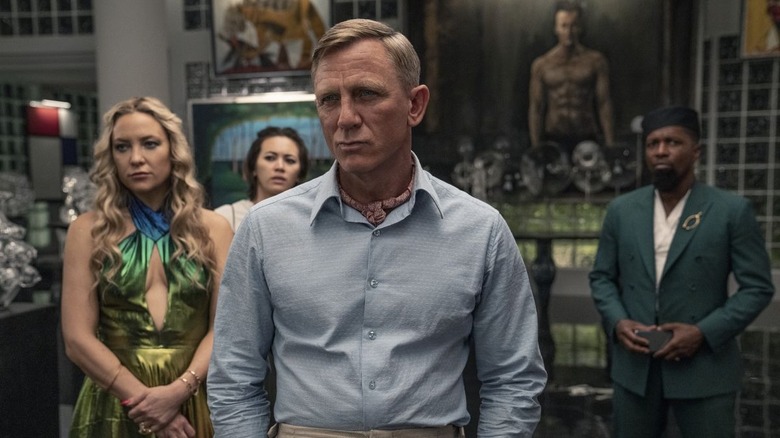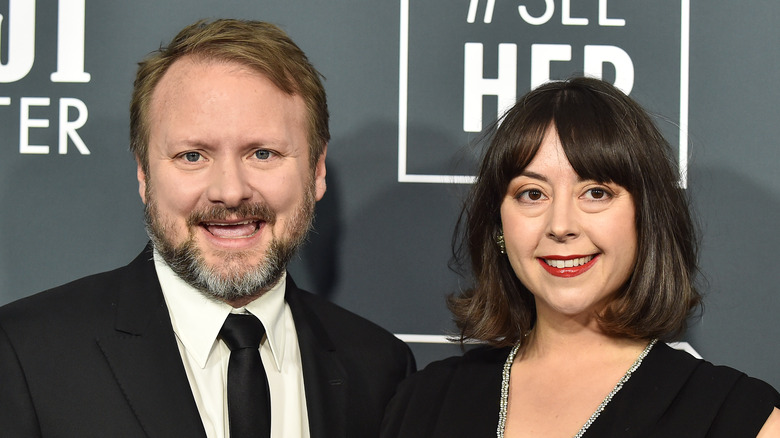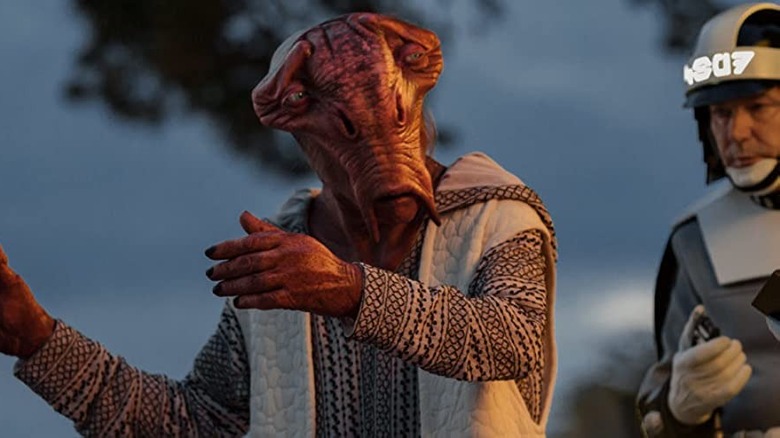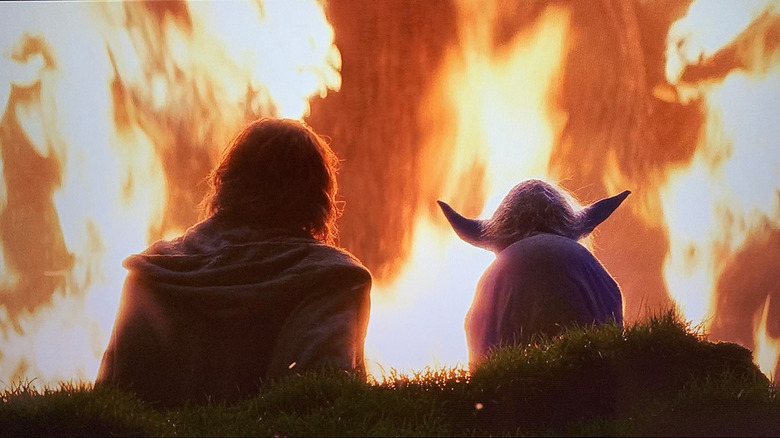Rian Johnson's Journey From Brick To Powerhouse Movie Director
Today, Rian Johnson is in an elite class of writers and directors who can command nine-digit contracts. He's known and, for the most part, appreciated for his quick-witted, tightly plotted, and often irreverent takes on popular genres. His six films (so far) are carefully constructed and multilayered in terms of tone and meaning in a way that's typically characteristic of indie cinema, yet they're all enjoyable and accessible in a way that's more on par with summer blockbusters. Johnson's skillset, as well as his relentless determination, practically predestined him for the career he has now, but — much like a Rian Johnson movie — his journey from wannabe filmmaker to industry darling (with a legion of devoted fans to boot) is full of unexpected and amusing twists and turns.
Anyone who's seen "The Fabelmans" might recognize how similar Rian Johnson's origin story is to that of Steven Spielberg's. Johnson's family moved from Silver Springs, Maryland to Colorado, finally landing in California, where Rian got his hands on his first Super 8 camera. The rest is history ... well, film history in the making, as the 49-year-old has no plans to slow down. Johnson is following up the Netflix hit "Glass Onion" with the TV series "Poker Face," which he created for Peacock. The mystery-of-the-week dramedy will star Natasha Lyonne (who collaborated on the series), with an impressive double-digit number of famous faces in recurring and guest spots. So how did Rian Johnson become so hot that every studio wants to sign him and every actor wants to work with him? Read on.
He attended one of the world's best film schools (after multiple rejections)
Rian Johnson graduated from the University of Southern California's School of Cinematic Arts in 1996. The program's noteworthy alumni include John Carpenter, Ron Howard, John Singleton, Robert Zemeckis, Judd Apatow, and Ryan Coogler, not to mention George Lucas. Practicing one's craft at such a prestigious and well-connected institution is an auspicious start to any aspiring filmmaker's career. However, Rian's path to a diploma was a little bumpier than his top-tier academic credentials suggest.
Johnson was accepted into USC, but not into the film school. He went into his freshman year of college with his major undeclared and continued to apply to the department every semester with no luck. One of the hang-ups was his mediocre performance in high school. Though Johnson's whip smart screenplays prove he's as clever as they come, as a teenager, he prioritized making movies with his friends over earning good grades. He'd made more than 100 shorts by his senior year. But halfway through his junior year of college, with time running out, he took what seems to him even in retrospect to be an unadvisable risk. The literature major, now five semesters into his university career, wrote an angry letter to the film school basically telling them he didn't need them, and it worked. Johnson was admitted to the School of Cinematic Arts, where he's now proudly listed among its distinguished graduates.
His short film is based on an Edgar Allan Poe classic
In his senior year, Johnson directed a short film that contains many of the elements that would define his work in the future. "Evil Demon Golfball from Hell!!!" is an eight-minute-long modern retelling of Edgar Allan Poe's "The Tell-Tale Heart." It's shot in black and white and was made with practically no budget. The plot revolves around an armed burglar who shoots and kills the cigar-smoking yuppie occupant of the Los Angeles mansion he's in the process of robbing. Just prior to his death, the victim bounces a golf ball with his initials on it. The golf ball becomes possessed and torments the burglar, who can't escape it despite tossing it as far as he can and locking it in a box. He's quickly (it is a short film, after all) driven to madness by the golf ball — an ever-present reminder of his guilt.
"Evil Demon Golfball from Hell!!!" is full of inventive camera work and other promising filmmaking choices, but what makes it feel like a Johnson movie is the way it plays with crime and class, all while maintaining a sense of humor. The short is still shown at USC today as an example of effective student work and is occasionally screened at theaters. It's also included as a bonus feature of the Blu-ray of "Looper." If you don't have a hard copy in your possession, you can watch some of Johnson's earliest work here.
He filmed Brick at his former high school
Johnson wrote the script for what would become his first full-length feature the year he graduated from college, but it took him seven more years to scrounge together the financing to actually make it. "Brick" was to be a hardboiled noir in the style of the Dashiell Hammett novels that Johnson read and loved as a kid, but set in a high school so as to keep from unintentionally copying Hammett's or anyone else's work. The project was too risky, and Johnson was too green for studios to bankroll. His family, who worked in construction, gave him a partial loan which the writer-director used to entice other investors. "Brick" went into production with a budget of $450,000 ... a pittance for what Johnson was trying to accomplish.
To save money, he filmed over a mere 20 days in his hometown of San Clemente, California using his actual former high school for the majority of the set pieces. He relied on people he knew and had pre-existing relationships with to round out his crew; his cousin Nathan Johnson wrote the score, and film school friend Steve Yedlin did the cinematography. For the lead role, he cast a young Joseph Gordon-Levitt, who had co-starred on the sitcom "3rd Rock from the Sun" and had only just begun his fruitful career in both independent and genre cinema. "Brick" premiered at the Sundance Film Festival and won a special jury prize for Johnson's "originality of vision." It continued to do well on the festival circuit and with critics and audiences.
The Brothers Bloom was under-seen and under-appreciated
Johnson made "Brick" first, but he had the idea for "The Brothers Bloom" a few years before, which he got to write and direct following the success of "Brick." He wanted to make a movie that subverted the basic setup of a con man movie. "The Brothers Bloom" keeps the classic structure of films like "The Sting" — two men and the woman who gets between them — but adds more comedic elements and a twist ending that upend the viewer's expectations and pretty much pulls a con on the audience. Mark Ruffalo and Adrien Brody play the titular brothers, Stephen and Bloom (yes, Bloom Bloom) and Rachel Weisz is Penelope — the woman who complicates their relationship. Stephen is the architect of their schemes, Bloom is the charmer who brings in marks, and Penelope is their latest target ... a bored and lonely heiress.
"The Brothers Bloom" was well-received when it premiered at the 2008 Toronto International Film Festival, but it went on to bomb at the box office. However, that's not entirely the fault of the movie. Summit Entertainment bought the rights to the caper and pulled it from the festival circuit, thinking they had a more commercially appealing hit on their hands, but the distributor didn't have the funds or the know-how to properly market their acquisition. Consequently, in May of 2009, "The Brothers Bloom" quietly came and went. Though reviews on the whole were mixed, some critics and fans rave about this under-seen and underrated Rian Johnson film.
He directed Breaking Bad's best episode
In between writing and directing independent movies, Rian Johnson kept busy by directing episodes of one of the most popular and acclaimed shows on television. "Breaking Bad," which aired from 2008 to 2013, chronicled the descent of Walter White from dispirited high school chemistry teacher with late-stage cancer to increasingly ruthless meth dealer. The series was created by Vince Gilligan, but Johnson helmed three of the show's most memorable (for different reasons) episodes.
Johnson directed Season 3, Episode 10, "Fly," a bottle episode in which Walter is bothered by his guilt and a fly that's buzzing around the lab — not unlike Johnson's short film about a demon golf ball. According to Gilligan, "Fly" had to be small-scale and cheap to make because production had gone over budget. Johnson also went behind the camera for Season 5, Episode 14, "Ozymandias," which makes allusions to the Percy Shelley poem of the same name and is often cited as the best "Breaking Bad" episode. The high point of Johnson's tenure on "Breaking Bad" came in Season 5, Episode 4 with "Fifty-One." The title refers to Walter's 51st birthday. In 2013, Johnson was honored with a Director's Guild of America award for his efforts.
He broke through with Looper
Though "Brick" and "The Brothers Bloom" are cult favorites and his "Breaking Bad" episodes are standouts, Rian Johnson simply wouldn't have the career he does today without "Looper." Johnson had the idea for movie about a time-traveling assassin back when he was making "Brick" with Joseph Gordon-Levitt. He even wrote a four-page script for a potential short film. Years later, with a budget of around $30 million dollars and the star power of Bruce Willis (who signed on to play the older iteration of Gordon-Levitt's Joe), Johnson got to make a significantly expanded version of the character-driven sci-fi action drama he'd imagined. "Looper" premiered at the Toronto Film Festival in 2012 (as have most of his movies) and was released shortly thereafter worldwide.
Johnson made a good first impression with "Brick" and kept that goodwill afloat with "The Brothers Bloom," but he broke through in a big way with "Looper." The film made more than $170 million dollars and was one of the best reviewed of the year. Critics praised Johnson for being complex and cerebral in a way that audiences could digest without getting too bogged down in the science-y mechanisms of time travel and focusing on the performances and the artistry instead. "Looper" was called brilliant, inventive, original, and surprising, and it cemented Johnson as one of the most sought-after directors in Hollywood, on par with contemporaries like Christopher Nolan and J.J. Abrams.
He shook up the Star Wars galaxy with The Last Jedi
The fact that Rian Johnson made "Looper" broadly appealing caught the attention of executives seeking up and coming directors to steer their tentpole franchises. Johnson told Variety, "I had been approached to do bigger stuff, and I had just gotten in the habit of saying no." That was, until "Star Wars" and Kathleen Kennedy came knocking. He had taken what he called "water-bottle meetings" with Kennedy before, but this time, she had a specific offer: the second film in the yet-to-be-officially-launched "Star Wars" sequel trilogy. Johnson was intrigued, and the new characters that J.J. Abrams and Lawrence Kasdan created for "The Force Awakens" sealed the deal.
That project became "The Last Jedi," a sequel over which he ended up having a surprising amount of creative control. "Episode VIII" follows Rey's (Daisy Ridley) attempts to convince Luke Skywalker (Mark Hamill) to rejoin the Resistance and to possibly turn Kylo Ren (Adam Driver), with whom she realizes she shares a unique bond. "The Last Jedi" received strong praise from critics and became the second highest grossing "Star Wars" movie to date, making more than $1.3 billion, stats that should thrill any writer-director. However, the movie became a major topic of contention, especially online, as some "Star Wars" fans reacted poorly to Johnson's characterization of Luke, and even resorted to bullying new cast addition Kelly Marie Tran off of social media. The film's defenders love how Johnson took a lightsaber to what was stale about the franchise. More than five years later, "The Last Jedi" discourse is still going strong. There might not be a consensus about it, but it does inspire passion.
His careful study of Agatha Christie influenced Knives Out
Rian Johnson was under less scrutiny with his next project — an original murder mystery that he had rattling around in the back of his mind for about 10 years. The title — "Knives Out," inspired by the 2001 Radiohead song of the same name, came to him first. But the essence was inspired by bestselling English detective novelist Agatha Christie, who Johnson feels is often misunderstood. He told Sight and Sound Magazine that while Christie has a reputation for having penned "dusty" old trope-filled whodunnits, she actually had quite a "modern sensibility" in her own time. He appreciated how her books (and the 1970s films based on them) took themselves seriously but retained a sense of fun and social commentary. That's what he sought to do with "Knives Out," which enormously subverts the genre's typical structure and skewers the hypocrisy of the Thrombey family, whose wealth comes from their patriarch — a prolific murder mystery author.
Johnson imagined his detective Benoit Blanc (Daniel Craig) as a Southern gentleman with a soothing presence. He surrounded him with excellent actors like Jamie Lee Curtis, Chris Evans, Christopher Plummer, Toni Collette, and then relative unknown Ana de Armas, and the result was one of 2019's biggest and most unanticipated hits. "Knives Out" made more than $300 million on a $40 million budget, received nearly unanimously positive reviews, was Oscar nominated for best original screenplay, and practically singlehandedly revitalized the murder mystery movie genre.
Netflix won a bidding war for Benoit Blanc
A surprise hit can provide a filmmaker with a proverbial blank check to make (or keep making) whatever types of movies their heart desires. "Knives Out" didn't net Johnson a blank check per se, but the $450 million dollar check that Netflix wrote for the rights to the franchise was probably larger than he ever could've imagined. Netflix outbid the likes of Amazon and Apple for two subsequent "Knives Out" sequels, both to be written and directed by Johnson and to star Daniel Craig in one of the biggest streaming deals ever. That amount seems wildly out of proportion for a low to mid-budget movie that isn't about, say, dinosaurs or superheroes, especially considering "Glass Onion" only played in theaters for a week before heading to the service.
But there was a method to Netflix's seeming madness over Johnson's murder mystery IP. The streaming giant has struggled in two areas — compared to its major competitors, it lacked a film franchise with a reliable and passionate fandom (expensive projects like "Red Notice" and "The Gray Man" fell flatter than expected) and it's eager to win Oscars. Johnson could help them reach both goals. "Knives Out" has a built-in fanbase, the murder mystery genre has built-in franchise potential, and Johnson's writing in particular has built-in awards prestige. So far, so good. "Glass Onion" packed theaters during its limited theatrical run and has dominated Netflix's most-watched list. The follow-up is just as sharp and crowd pleasing as the original (it allows Benoit Blanc to have much more fun), and it's squarely in the awards conversation.
He's married to a popular film podcaster
Movies aren't just Rian Johnson's profession — they're a big part of his personal life, too. The writer-director met pioneering blogger-turned-critic-turned-famed podcaster Karina Longworth during a question-and-answer session for "The Brothers Bloom" in 2009. The pair have been together since 2011. Longworth moved with Johnson to the U.K. while he was filming "The Last Jedi" and worked remotely on her industry favorite podcast, "You Must Remember This," which chronicles Hollywood history. The couple tied the knot in 2018 and resides in Los Angeles.
LA is notorious for being a place that few people are actually from, but Longworth was born and raised there, and knows the town, the people, and the art of filmmaking inside and out. Her writing and reporting — on everything from Disney's regrettable "Song of the South" to the Manson family — is thoroughly researched, cleverly told, and utterly compelling (not unlike her husband's work). It's easy to see how these two found each other and why they get along so well. Longworth's extensive knowledge and critical eye are clearly a resource for Johnson, who gives her a special thanks in his films' credits. This cinematic power couple gives back, too. Johnson and Longworth recently pledged $100,000 to help preserve a historic video store and theater during the pandemic.
He's loyal
Rian Johnson is loyal. Just ask his cousin Nathan Johnson, who composes his music, or Steve Yedlin, who's his cinematographer of choice, or Bob Ducsay, who's been his editor since "Looper." Or ask Joseph Gordon-Levitt, who's been in every single one of Johnson's films, even if that's not apparent upon a first watch. After starring in "Brick," Johnson gave JGL a small, uncredited role in "The Brothers Bloom." He was the headliner again in "Looper," and since then he's had extremely hard-to-spot cameos in each of Johnson's subsequent blockbusters, which has become something of its own in-joke and an Easter egg for audiences.
In "The Last Jedi," Gordon-Levitt plays Slowen Lo, an alien known as an Abednedo who can be seen during the Canto Bight sequence. In "Knives Out," he's Detective Hardrock, a character in a police procedural that Ana de Armas' Marta watches in the world of the movie. His inclusion in "Glass Onion" is even more absurd. Gordon-Levitt voices the dong sound that Edward Norton's Miles claims is composed by Philip Glass. Noah Segan, who plays stoner houseguest Derol in "Glass Onion," also appears in every Rian Johnson movie starting with "Brick," and also appears in one of Johnson's episodes of "Breaking Bad." It's clear that Johnson establishes good working relationships with his creative partners, which doesn't hurt in a line of work that's as unstable as filmmaking.
Franchises will factor into his filmmaking future
Though Johnson started out writing and directing his own stories, his filmography is likely to be franchise-heavy going forward. We already know there's a "Knives Out 3" scheduled to drop in 2024, and Johnson has expressed openness to making more, including a fan-suggested holiday special. Less certain is the status of his "Star Wars" trilogy, which was announced back in 2017. While the project hasn't been officially canceled, Johnson and Kennedy also haven't made any progress on it (at least none that's been made public). The director's most recent comments on the matter are that he'd be "sad" if it didn't happen but it "wouldn't be the end of the world." The corporate drama Disney's dealing with at the moment leaves the status of his "Star Wars" films (and others) even more up in the air.
Whatever the now established and bankable filmmaker works on next, one thing's for sure — it won't be too precious. Though he hops and skips between genres and budget sizes, there's always a Rian Johnson signature. His films are smart without being pretentious and stylish without being superficial, but above all else, they delight at poking holes in myths and conventions. Johnson literally set fire to the Jedi tree and the Mona Lisa. And with all of his movies — be they noir, romance, sci-fi, or mystery — he pulls the rug out from under the audience in a way that (to studios' benefit) gets people talking.
